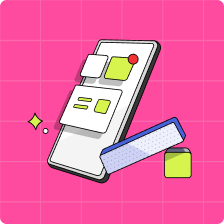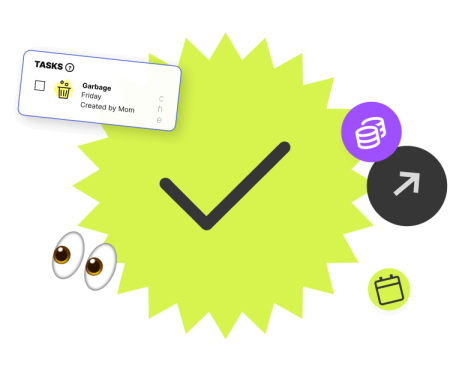It probably seems like it was just yesterday that your teen was a squealing infant with toes the size of peas, and suddenly they’re a mini-adult with their own opinions and big dreams. You’re probably wondering how to help them make good choices now so they’re financially secure when they leave the nest. To start, give them these money management tips to help them avoid some of the biggest financial mistakes teens make.
Key takeaways
- Money habits develop from a young age.
- You can help set your child up for success by modelling good money management, letting them practice financial skills, and warning them about the worst money mistakes.
- Some of the biggest financial mistakes youth make involve basic skills like budgeting and saving.
- Other money mistakes include poor planning around loans and debt, getting a credit card too early, and taking out large loans with no plan for repayment.
- Unrealistic ideas about money may cause teens to be too trusting, gamble with risky investments, or expect parents to fix everything.
Why is money management important for teens and youth?
You know the expression “Old habits die hard?” It applies to everything from diet and exercise to money management. A teen who develops lousy money habits (like blowing their full allowance or paycheque the instant they get it) may find it harder to live within their income, pay their bills on time, and save for the future when they become an adult.
That’s where you come in. You have the power to influence your teen’s ideas about money, credit, and debt and help teach them the skills they need to set themselves up for financial success. There are a few things you can do:
- Set a positive example of how to manage your money by taking time to save up for bigger purchases, sticking to your list when grocery shopping, and paying your bills on time.
- Help your child practice key financial skills like budgeting, tracking spending, and saving.
- Teach them about some of the biggest money mistakes to avoid.
What are the worst money mistakes youth often make?
Nobody’s perfect, but some of the biggest money mistakes that youth and teens make might be avoided with a little education and planning. Here are 10 of the most common financial blunders teens make as they start to gain independence—and how you can help them do better:
1. Not learning how to budget
The time to teach your child about budgeting is ASAP so that by the time it becomes a crucial skill for juggling the costs of food, rent, car insurance, and more, it will already feel like second nature for your newly independent young adult.
This guide to budgeting for teens can help you and your child develop a basic budget and discover the tools to help them stick to it.
Learn more: What is zero-based budgeting? A guide for parents and teens.
2. Not saving for the future
Along with budgeting, saving is one of the most important aspects of good money management for youth—and failure to save is one of the worst money mistakes a young person can make. In adulthood, squirrelling away money for emergencies (e.g., job loss, car repairs, dental bills) and retirement is fundamental for financial security. Teens can practise by saving for a new computer or a graduation trip so that delaying gratification becomes a habit.
Learn more: Emergency funds explained for teens
And if they’re feeling really ambitious, they can even put a portion of their allowance or paycheque into an RRSP. The big perk of starting to save for retirement early is a little thing called compound interest. The longer an RRSP has to grow, the bigger that nest egg will be when it comes time for them to retire.
This primer on interest rates offers a great first look at simple and compound interest as well as tips on finding a good interest rate.

3. Buying too many things they want rather than need
Throughout the day, friends, influencers, and advertisers bombard teens on social media with everything from lip gloss to headphones, and it can be hard for them to say no when trends change weekly. But always caving in to consumer pressure is one of the worst money mistakes anyone can make. Very quickly, your teen will have no funds left to pay for the things they actually need.
Needs and wants can sometimes feel like the same thing. (You’ve probably heard your child whine “But I need it!” at least once when begging for a new toy, gadget, or piece of clothing.) This needs vs. wants explainer can help you teach your kid the difference.
Learn more: How to help kids and teens avoid impulse buying.
4. Getting a credit card too early
In Canada, your teen won’t be able to apply for a credit card until they reach the age of majority in their province (either 18 or 19). However, they may be eligible to be an authorized user on your credit card from a younger age. In that case, any late payments or outstanding balances will impact your credit history as the main cardholder.
But should a teen get their own credit card as soon as they reach the age of majority? It depends on the individual. While building credit from a young age makes sense, having a credit card is also a big responsibility. If your teen has no source of income or struggles with money management (meaning they tend to overspend or are likely to only make the minimum payments), then they may end up paying more for everything they buy, accumulating debt, and developing poor credit.
This credit card primer can help you decide if it’s time for your teen to get a credit card or become an authorized user on your account. Meanwhile, Mydoh’s Smart Cash Card is a risk-free way to test out your teen’s ability to manage their money.
Read more: How to apply for your first credit card.

5. Getting an expensive car loan
A fancy car with all the bells and whistles may feel like the perfect purchase for a teen looking forward to their first set of wheels, but it could also become a burden. Unless your teen has saved a large sum, or you’re willing to pay the purchase price or car payments for them (not to mention insurance, gas, repairs, and everyday maintenance), they could end up with a large monthly expense and no way to pay it.
To cut down on costs, riding public transit or cycling may be good alternatives to car ownership if there are viable options where you live. Purchasing a second-hand car that won’t rack up huge loans may be another smart option. These tips for buying a first car can help.
6. Going deep into debt for college or university
For many teens, getting a university education is a big part of their post–high school plans. And while additional schooling can be one way to create more job opportunities in the future, it can also put a strain on anyone who’s not financially prepared. Many Canadian students rack up loans in the tens of thousands of dollars, and they’re tasked with paying off that debt just as they’re starting to break into the job market.
Even if you plan on helping them out with tuition, these tips can help minimize the amount they’ll owe after graduation:
- Apply for grants, scholarships, and bursaries.
- Choose a school that’s close to family so rent-free living is an option.
- Work a part-time job in high school and save money for expenses like tuition, books, transportation, and food.
- Don’t automatically accept any loan amount that’s offered. It’s smarter to take only what’s needed based on an estimated monthly budget.
Discover more tips for paying for post-secondary education.

7. Spending more than they earn
When there’s a new makeup launch or concert every week, your teen may be tempted to borrow money, rack up a bunch of purchases, and think about paying it back another day. But a good rule of thumb for teens (and anyone else hoping to develop a good financial track record) is to monitor spending and stick within their earning limits. If your teen wants to spend more than they currently earn through their allowance or work, then they’ll need to pick up more hours or find odd jobs to make up the difference.
Struggling to explain the concept of debt to your kid? This guide to debt for parents and teens keeps it simple.
8. Making risky investments
Digital assets like cryptocurrency, NFTS, and meme stocks might seem like the next big thing in investing, but they’re also unpredictable and can fluctuate by huge amounts in no time at all. For someone who’s new to investing or who craves financial security, they’re generally considered a risky choice. (They may pay off one day, but no one knows for sure.)
If a teen wants to experiment with a small amount of money to learn more about the future of financial platforms, blockchain, and investing in general, that’s great! But you know what’s not a good idea? Gambling hard-earned money that they can’t afford to lose.
These guides can help you and your teen get a better grasp on the world of cryptocurrency and NFTs.

9. Trusting friends, partners, and roommates with their money
When your child was young, you probably told them that “sharing is caring” and encouraged them to be generous with their toys. But now that they’re a bit older and have started to earn some money, set budgets, and save for the future, being too generous is one of those classic money mistakes to avoid. Encourage your teen to be careful as they navigate some of these potential pitfalls now or in the future:
- Loaning money: Loaning large sums of money to friends could be risky and may negatively affect the friendship if the money isn’t repaid on time—or ever.
- Sharing a bank account: It may be tempting to create a shared bank account with a romantic partner, but teens and adults alike should avoid pooling funds unless they’ve had honest talks about financial goals and habits and are confident that both they and their partner are committed to a long-term relationship.
- Choosing roommates: Having a roommate or two makes the burden of rent easier to manage, but encourage your teen to choose wisely! Someone who can be trusted to pay their bills and take care of the space is a way better choice than a party animal who will trash the apartment, run off to Europe with no notice, or refuse to budget and as a result be unable to afford their portion of the rent.
10. Expecting parents to clean up their mess
While you may want to protect your kid from any trouble that comes their way, forever bailing them out after their worst money mistakes will actually do more harm than good. You can still teach them good financial habits and be a sounding board if they’re struggling to keep up with their bills, but let them be independent by resisting the urge to always fix everything for them. They’ll learn that they can curb spending, stick to a budget, and work hard to reach financial success—and that they don’t need Mom’s or Dad’s money to do it.
How to help your teen avoid the worst money mistakes
If you’re looking for ways to teach your kid the value of money, plus how to budget, save, and manage credit, there are a few things you can do:
- Encourage them to track every dime they spend. The Mydoh app allows them to check their earnings and spending right on their phone.
- Use the Should I But It? Quiz to help teens calculate their cost-per-use before buying a big ticket item.
- Help them develop a budget based on how much they earn and what they hope to buy. Choose a percentage—whether five, 10, or 20 per cent—that will go directly into a savings account.
- Have them pay their own phone bill each month to practise their budgeting skills and learn how to stick to deadlines.
- Next time they want something they can’t afford, don’t just buy it for them. Have them complete tasks—from doing the dishes to mowing the lawn—to earn an amount that you set.
- Sign your teens up for a practice trading account and try online investing without using real money before plunging their cash into the latest type of cryptocurrency.
- Before signing your teen up for a credit card or adding them onto your card as an authorized user, have them practice with the Mydoh Smart Cash Card. They can use it like a credit card (except there’s no interest, debt, or credit score impact).
The bottom line
One day, your teen will be solely responsible for their own financial well-being. For now, you can help them learn good habits and urge them to avoid the worst money mistakes that teens can make. By helping your child practise the staples of good money management, including budgeting, saving, and investing, as well as teaching them realistic ideas about financial responsibility, debt, and credit, you can set them on the path to a money-smart life. Mydoh is here to help.
Download Mydoh and help build the foundation of financial literacy for your kids and teenagers.
This article offers general information only and is not intended as legal, financial or other professional advice. A professional advisor should be consulted regarding your specific situation. While the information presented is believed to be factual and current, its accuracy is not guaranteed and it should not be regarded as a complete analysis of the subjects discussed. All expressions of opinion reflect the judgment of the author(s) as of the date of publication and are subject to change. No endorsement of any third parties or their advice, opinions, information, products or services is expressly given or implied by Royal Bank of Canada or its affiliates.








